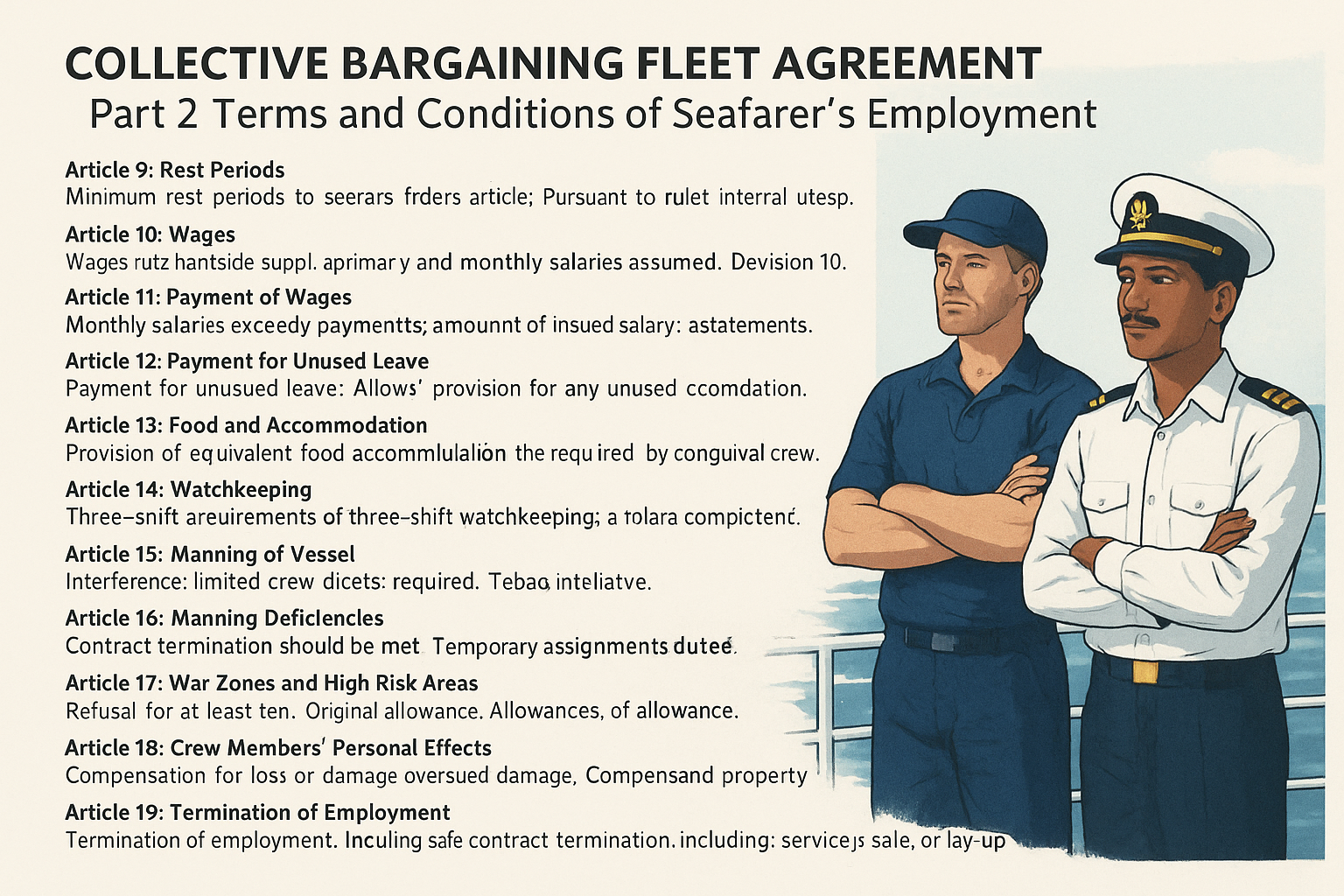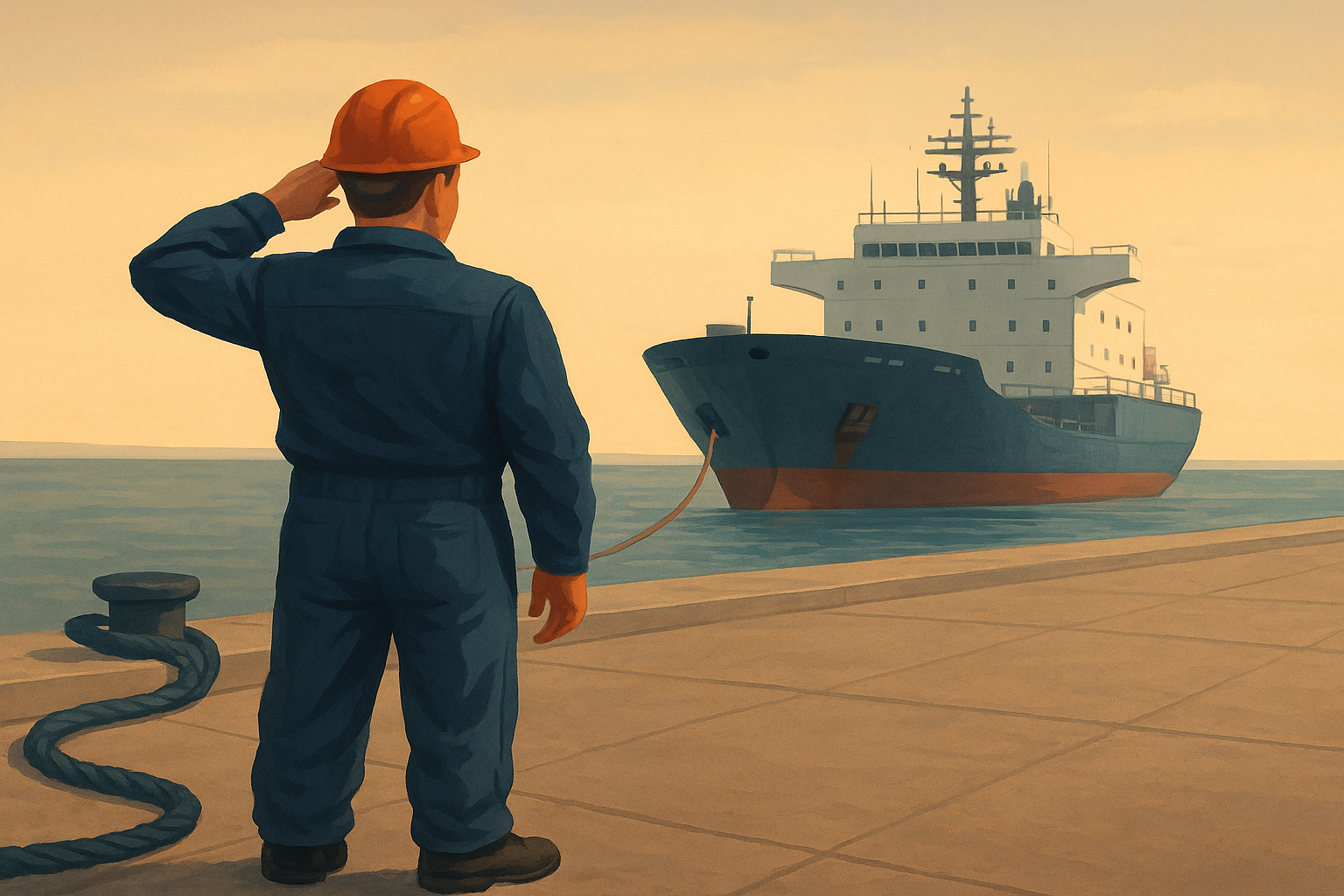Collective Bargaining Agreement – Part 1
What is CBFA?
The Collective Bargaining Fleet Agreement (CBFA) is a key legal document that governs the working conditions, legal status, social guarantees, duties, and rights of seafarers employed on ships covered by the agreement. The CBFA is concluded between maritime trade unions and the shipowner or representatives of the shipping company.
The CBFA takes precedence over individual employment contracts where it provides better working conditions, as long as it does not conflict with the standards of the MLC 2006 or national legislation. It guarantees transparency, protection in the event of disputes, and defines safety standards, working hours, wages, and social benefits.
Content of the Collective Bargaining Agreement
1. General Provisions
This section defines the parties to the agreement, its legal force, scope of application, and duration. The CBFA applies to all ships of the company or fleet unless otherwise specified in supplementary agreements. It serves as the basis for regulating relationships between the crew and the employer.
This section defines the parties to the agreement, its legal force, scope of application, and duration. The CBFA applies to all ships of the company or fleet unless otherwise specified in supplementary agreements. It serves as the basis for regulating relationships between the crew and the employer.
2. Pre-Employment Period
Before signing the main contract, a seafarer candidate must complete the following steps:
Before signing the main contract, a seafarer candidate must complete the following steps:
- provide documents confirming qualifications;
- undergo medical and psychophysiological examinations;
- complete forms and pass a suitability assessment for the position;
- become familiar with the upcoming voyage, including its duration, route, and vessel specifics.
The employer, in turn, has no right to discriminate against the seafarer at this stage and is obliged to provide information about working conditions, safety, wages, insurance, and repatriation.
3. Probationary Period
The initial period on board, typically up to 30 days, is considered a probationary period. During this time:
The initial period on board, typically up to 30 days, is considered a probationary period. During this time:
- the seafarer performs duties according to their position;
- the captain or chief engineer evaluates their professional suitability;
- either party may terminate the cooperation without penalties.
Nonetheless, even during the probationary period, the seafarer is entitled to a full social package, medical assistance, and payment in accordance with the contract terms.
4. Work Schedule and Rest
The CBFA strictly regulates:
The CBFA strictly regulates:
- the length of the working week (maximum 48 hours);
- daily rest (at least 10 hours);
- weekly rest (at least 77 hours);
- shift distribution ensuring work-rest balance.
Conditions must comply with STCW, ILO, and MLC requirements. Violations are recorded in the ship’s log and may be grounds for filing a complaint with the union.
5. Wages
The CBFA guarantees:
The CBFA guarantees:
- a basic rate depending on the position;
- overtime pay (usually 1.25–1.5 of the base rate);
- holiday bonuses;
- monthly allotments to the family;
- compensation in case of salary delays.
Payments must be made regularly and documented. The employer has no right to make deductions without the seafarer’s written consent.
6. Insurance and Social Guarantees
The seafarer has the right to:
The seafarer has the right to:
- life and health insurance;
- coverage of expenses in case of illness, injury, or repatriation;
- medical care in any country during the voyage;
- reimbursement of medical costs after the contract ends (in case of occupational disease or injury).
The insurance policy must be arranged before boarding, and the seafarer must be informed of its terms.
7. Employer's Responsibilities
The employer is obliged to:
The employer is obliged to:
- ensure safe working conditions;
- conduct briefing and vessel orientation;
- provide food, living conditions, and access to medical care;
- arrange documentation, visas, insurance;
- keep records of working hours.
8. Seafarer's Responsibilities
The seafarer agrees to:
The seafarer agrees to:
- perform duties diligently;
- observe maritime discipline;
- remain sober during duty;
- report malfunctions, accidents, or safety violations;
- treat other crew members with respect.




